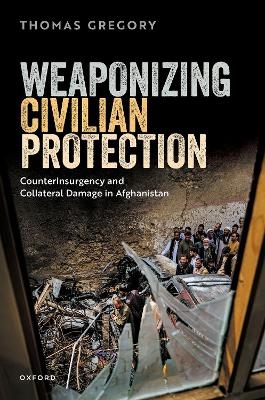
Weaponizing Civilian Protection
Oxford University Press (Verlag)
978-0-19-889738-5 (ISBN)
- Noch nicht erschienen (ca. Februar 2025)
- Versandkostenfrei innerhalb Deutschlands
- Auch auf Rechnung
- Verfügbarkeit in der Filiale vor Ort prüfen
- Artikel merken
Weaponizing Civilian Protection exposes how coalition efforts to minimize and mitigate civilian casualties during the recent conflict in Afghanistan also worked to rationalize the harm inflicted upon Afghan civilians. Drawing on declassified documents and interviews with coalition officials, it traces how civilian protection was reimagined as a martial tactic rather than a humanitarian imperative, with coalition officials reframing civilian casualties as strategic setbacks that could imperil the entire mission.
This book examines the restrictions that coalition officials imposed on combat operations to minimize unnecessary harm to civilians, whilst showing how these restrictions served to constitute civilian casualties as necessary in certain situations, rendering their lives losable and their deaths ungrievable. At the same time, it examines the post-incident mitigation measures coalition officials used to prevent civilian casualties becoming strategic setbacks, including the condolence payments that were offered when civilians were harmed. Rather than seeking to make amends for the harm inflicted upon them, it claims that these post-incident mitigation measures are best characterized as a necropolitical device concerned with managing mortality more effectively. Crucially, Weaponizing Civilian Protection shows that co-opting civilian protection into a martial logic that is more concerned with winning wars than protecting the civilian population works to devalue and dehumanize civilians, leaving them more vulnerable to death and destruction in future conflicts.
Thomas Gregory is Senior Lecturer in Politics and International Relations at the University of Auckland, New Zealand. His research examines violence against civilians in contemporary conflict, with a specific focus on how civilians are constituted as killable, how civilian casualties are counted, and how civilian casualties are legitimized, rationalized, or excused. His research has appeared in leading academic journals, including International Political Sociology, Review of International Studies, Contemporary Security Policy, and the European Journal of International Relations.
Introduction
1: Calibrating Violence: Counterinsurgency and Civilian Casualties
2: Weaponizing Civilian Protection: Minimizing and Mitigating Civilian Casualties
3: (Not) Bombing Civilians: Airstrikes and Civilian Casualties
4: (Not) Shooting Civilians: Night Raids and Force Protection
5: (Not) Counting Civilians: Weaponizing Body Counts
6: (Not) Compensating Civilians: Money as a Weapons System
Conclusion
| Erscheint lt. Verlag | 15.2.2025 |
|---|---|
| Verlagsort | Oxford |
| Sprache | englisch |
| Maße | 156 x 234 mm |
| Themenwelt | Geschichte ► Teilgebiete der Geschichte ► Militärgeschichte |
| Sozialwissenschaften ► Politik / Verwaltung ► Europäische / Internationale Politik | |
| ISBN-10 | 0-19-889738-3 / 0198897383 |
| ISBN-13 | 978-0-19-889738-5 / 9780198897385 |
| Zustand | Neuware |
| Haben Sie eine Frage zum Produkt? |
aus dem Bereich


